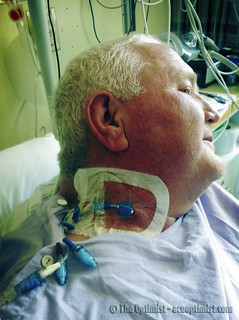While leading a class trip in Australia during Christmas break, an ACU professor had a brief encounter with a tick that left him hospitalized for several days.

Dr. Ian Shepherd remains in Australia after being hospitalized from a tick bite while on the COBA study abroad trip. (Photo provided by Shepherd)
Dr. Ian Shepherd, associate professor of management sciences, said he had to delay his return to the U.S. until Sunday, but he has been running his first week of classes online.
“Since my classes are technology based, this is not much different than my online classes during the summer,” he said.
Shepherd was traveling with students from two College of Business Administration classes. On New Year’s Eve he was leading a tour through the Lamington National Park in Queensland. Shepherd said it was during this excursion he encountered the blood-sucking arachnid.
The tick attached itself to the lower left side of his neck. Shepherd said he found and removed the tick around 5 p.m., but lost it when it ran away.
He said by New Year’s Day he felt “completely drained”. He said he experienced severe shivers and shakes during the day and that evening he was overwhelmed by weakness, and he noticed he was losing the use of his left arm and his right hand was numb. A student assisted him to his room where he said he promptly fell asleep.
Stephen Estrada, junior management major from San Antonio, was one of the students on the trip. He said everyone could tell something was wrong.
“Dr. Shepherd was having trouble speaking and showing some pretty good indicators that he wasn’t at his 100 percent,” he said.
The next day the group was scheduled to tour two companies. Shepherd said when the group arrived at the first factory they were greeted by Brad Johnson, a missionary in Brisbane and the group’s contact in Australia. As soon as the tour began, Shepherd said his symptoms began to worsen. When he explained his predicament to Johnson, he quickly drove Shepherd to the nearest doctor, who instructed them to get to the emergency room.
Johnson took Shepherd to the ER, where he was admitted immediately. Shepherd said at this point his blood pressure plummeted to 80 over 40 and his temperature was a little more than 102 degrees Fahrenheit.
Shepherd said the doctors did blood work and a urine test, then decided to introduce a central line to pump antibiotics into his heart and fluids to raise his blood pressure. The doctors told him he had kidney failure and sepsis (severe blood poisoning caused by infection) and that he was in dire condition.
Shepherd said, at this point, he told the doctors about the tick, causing “a whole new level of panic to set in.”
Shepherd was moved to the Intensive Care Unit. He said over the next few days he experienced pain, nausea, hallucinations and extreme weakness.
By Jan. 5, Shepherd said the central line was removed and he was discharged from the hospital. He said his brother and sister arranged for him to be transported back to Sydney to continue his recovery.
Wednesday he said his joint pain and soreness was better, but he was still struggling with mobility in his left leg. He also said he is still very tired.
Estrada said Shepherd was there to say goodbye when the rest of the group left Sydney to return to Abilene. He said the group was thankful Shepherd was able to get to the hospital in time.
“It was kind of scary to think that we were on the same excursions he was,” he said. “That means it could have been any of us.”
Shepherd said his doctors told him if he had waited any longer to get to a hospital, they might not have been able to save him.
“Brad Johnson literally did save my life,” he said. “One more hour difference in getting to the hospital could have killed me… I owe him my life.”
